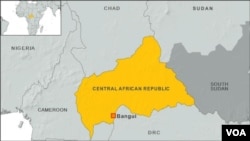Factions of three main rebel groups in the northern part of the country have again taken up arms against the government, threatening Bangui. Rebels took two towns in the central part of the country without a fight only days before peace talks set to begin in Gabon's capital, Libreville, on January 8.
The rebel coalition is called, Seleka, which means "alliance" in the local Sango language. But analysts in Bangui say the alliance is tenuous. And it is unclear who is part of the coalition.
Abdoulaye Hissein is President of the Convention of Patriots for Justice and Peace rebel movement in the northeast. He denies claims that his group has joined Seleka.
Hissein says Seleka spokesmen and ground commanders can not agree on the facts. He says that as someone who once fought the government, he feels the only option left is dialogue.
Seleka spokesmen have made conflicting statements to the media, including on whether they will attend the peace talks.
This is the third major rebellion in the north since mid-2005, following elections that transformed Francois Bozize from coup leader to president.
Bozize's government has signed several peace agreements with rebel groups, including a summary agreement called the Global Peace Accords in 2008. Seleka says the government has failed to live up to promises it made, notably to disband and pay rebel fighters, and reintegrate them into society.
Hardliners among the rebels demand that President Bozize step down, something the government says is out of the question.
Former government communications minister, Cyriaque Gonda, was a lead government peace negotiator in 2008 -- a duty, he says, he will again perform this month. Gonda says the rebels have found a common cause for now, but that it is hard to believe that hostilities among rebel leaders during 2008 have ended.
"I remember that some of them could not accept to sit together. Today, it's just a question of time. They have a specific objective and I know that at the bottom of the line, as soon as they get to the objective, which is to absolutely put down all institutions, then the division will come and this is where we are going to have a mess in this country," he said.
Gonda concedes that the government has fallen short on disarmament. He blamed a lack of international funding as well disagreements and leadership shuffles among the rebels.
The International Crisis Group said in 2010 that rebel leaders were focused on personal gain, like securing lucrative government jobs and high ranking posts in the army, undermining the peace process. There are no reliable estimates of Seleka's strength.
The head of the multinational African force deployed at Damara, some 75 kilometers outside the capital, General Jean Felix Akaga, says it impossible to know the number of rebel forces.
Akaga says he would be surprised if the rebels themselves knew how many fighters they have.
Analysts say the rebels' quick offensive -- taking a third of the country in about three weeks -- is not so much a testimony to their military prowess as it is to the weakness of the national army and its poor presence in much of the now-captured territory.
The government says the rebels have foreign support and foreign fighters, namely from neighboring Chad and Sudan. That claim has not been independently confirmed.
The origins of the three main rebel groups associated with Seleka can, in part, be traced to President Bozize.
The Union of Democratic Forces for Unity was formed in the northeast in 2006 by disgruntled fighters who helped Mr. Bozize overthrow President Ange-Felix Patasse. Pro-Patasse military officers formed rebel groups in opposition to Mr. Bozize that year, including another Seleka affiliate -- the Democratic Front for the Central African People.
Among their grievances, rebels have cited underdevelopment in the north and their marginalization in society.








